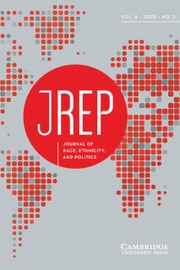Article contents
You seem like a great candidate, but…: race and gender attitudes and the 2020 democratic primary
Published online by Cambridge University Press: 26 January 2021
Abstract
The 2020 Democratic presidential primary unfolded in a context with significant attention to issues of racial and gender inequality and identity. The field began as an historically diverse one but a white male candidate received the party's endorsement. Did the race and gender attitudes of Democratic primary and caucus participants play a role in shaping the pool of candidates? Using a survey of self-identified Democrats, this study provides evidence that racial resentment, hostile sexism, and modern sexism enhanced the assessments on several evaluative criteria of the white male candidate, while depressing the assessment of the Black woman candidate. These relationships are driven primarily by white respondents. These findings add to our understanding of how race and gender attitudes affect the electoral process well before the general election, particularly by shaping the ultimate choice of candidates in that contest.
- Type
- Research Article
- Information
- Copyright
- Copyright © The Author(s), 2021. Published by Cambridge University Press on behalf of The Race, Ethnicity, and Politics Section of the American Political Science Association
References
- 8
- Cited by


